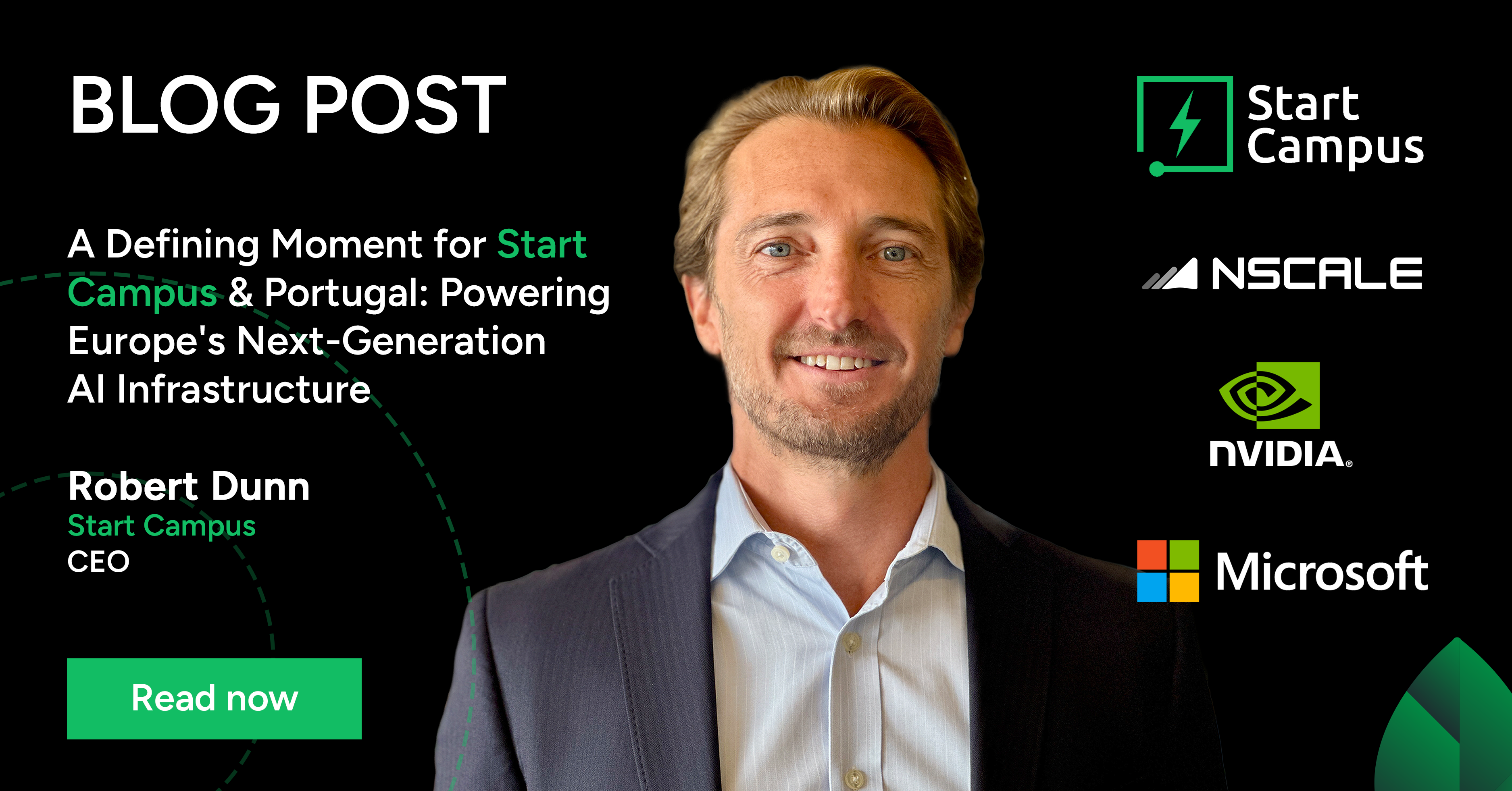A Defining Moment for Start Campus & Portugal: Powering Europe’s Next-Generation AI Infrastructure
This month marks a pivotal milestone for all of us here at Start Campus - one that underscores our vision, our commitment, and our role in shaping...
3 min read
 Start Campus
:
Updated on July 25, 2025
Start Campus
:
Updated on July 25, 2025
Data created, consumed, and stored has grown from 2 ZettaBytes (ZB) in 2010, 64 ZB in 2020 to more than 180 ZB expected in 2025. It’s safe to say that the digital infrastructure industry is facing immense growth. But the industry is also facing a global talent gap. Skilled resources are needed to help support and foster this explosive growth. As older generations age out of the industry (aka the gray tsunami), younger generations replace them. The conundrum is that there are not enough skilled people to accommodate growth and the gray tsunami at the same time.
This problem begs the question – who is skilled to do the jobs that the digital economy needs?
Data center jobs exist for every level of skill and many cross-functional areas of expertise. Apprenticeships and internships are being used as one avenue to fill vacancies, however, more work is needed to bring training and education to those who could adapt their experiences to fill required roles. College curricula have simply not maintained pace with demand. Further, many jobs in the industry do not require a formal university degree.
The digital economy needs data centers. These warehouse-sized facilities host the computing infrastructure that powers and drives data across the internet. The rising need for data centers has increased the need for skilled workers. According to Gartner, By 2025, “labor volatility” will cause 40% of organizations to report a material business loss, forcing a shift in talent strategy from acquisition to resilience. “The global data center market is challenged by a lack of available and qualified people. According to a study by Uptime Institute, global data center staff requirements are forecasted to grow by approximately 300,000 to 2.3 million people in 2025, up from 2 million in 2019.”[1] By 2025, there will be a need for 80,000 new data center staff in Europe alone. So, what should data centers do to mitigate this predictive trend?
Data centers need to invest as much in their personnel as they do in their facilities. Management needs to take the time to train employees, form a mentorship program, and invest time at local colleges and universities teaching the next generation of workers. There is also a gender gap that can be filled by employing more females and ensuring income equality across all positions.
Sines, Portugal is a good example of a tight-knit community that invests heavily in its local workforce. And – it’s an immensely underserved market for the global digital economy. By developing in the region, Start Campus is creating a new data center hub ripe with renewable and sustainable energy solutions, empowering a community to embrace technology that will no doubt leapfrog the country to be among the leading locations in Europe.
One example is the Colleges for European Data Center Education (CEDCE) Project which is developed in close partnership between several universities, Start Campus and Escola Tecnológica do Litoral Alentejano (local Sines technical school). CEDCE highlights the importance of European collaboration on data center education and how it plays an important role in the quality of education and employment opportunities. Start Campus also invests in creating more awareness of the industry as a whole. Start Campus is working together with National universities and regional technical schools, such as Instituto Politécnico de Setubal, Universidade de Évora, Universidade do Algarve, and Escola Tecnológica do Litoral Alentejano. They are working together to define and revise the course curriculum to adjust the pedagogical offer for the future of the industry as a whole.
Start Campus is responsible for the development of the SINES project, a Hyperscale Data Center campus located in Sines, Portugal. Start Campus sets the standard of how data center companies invest in people as they address the talent gap.
Start Campus is setting a precedent to address the talent gap in the digital infrastructure industry, but it takes an industry-wide effort to address the issue.
[1] Savills: European Data Centres Deep dive in the data sphere, November 2022

Start Campus is developing the SINES DC project, a 1.2GW data center campus in Portugal, creating Europe’s largest and most sustainable data ecosystem with market-leading global connectivity. SINES DC provides maximum optionality for customers with powered shell, turn-key and build-to-suit solutions. The company's advanced customer offerings are AI-ready and address the future needs of the industry by integrating liquid cooling technologies into its flexible and scalable design. With a total combined investment value of €8.5 billion, the project will use 100% renewable energy and targets an industry-leading PUE (Power Usage Effectiveness) of 1.1 and a WUE (Water Usage Effectiveness) of 0 by harnessing the cooling power of the ocean.
Get in touch with Start Campus

This month marks a pivotal milestone for all of us here at Start Campus - one that underscores our vision, our commitment, and our role in shaping...

Welcome to part two of four in our blog series highlighting our sustainable best practices. If you missed the first one “For the Planet,” you can...

The data center market in Europe is booming and yet is beginning to look completely different than it was. International market research and market...